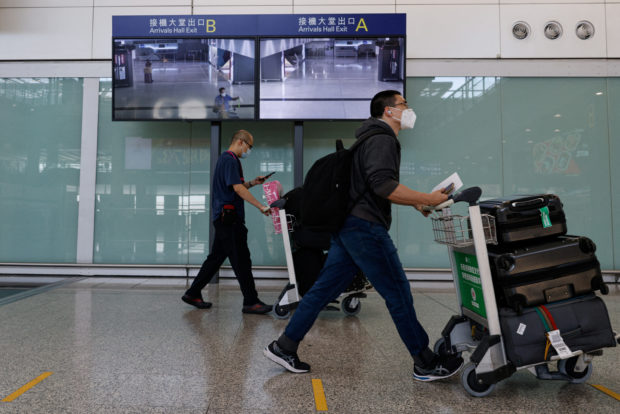As Hong Kong opens up, visitors can enter a gym or restaurant immediately

FILE PHOTO: Travelers arrive at the Hong Kong International Airport on the first day the COVID hotel quarantine has been scrapped, in Hong Kong, China September 26, 2022. REUTERS/Tyrone Siu
HONG KONG — People arriving in Hong Kong by international flights can immediately visit the city’s restaurants, gyms and other venues for the first time in almost three years, with the scrapping of restrictions that barred them from such places for the first three days.
The ending on Wednesday of an amber code that had been previously issued to international arrivals was announced on Tuesday by Chief Executive John Lee. Arriving people now have no movement restrictions but they need to do a PCR COVID test on arrival and again two days after arriving.
Hong Kong’s government also scrapped a mandatory COVID-19 mobile application on Wednesday which was used for people to check in at most venues from gyms and beauty salons to offices.
People will still need to show a photograph or paper record of their COVID-19 vaccines at some venues which require it, the government said.
“I think the government’s COVID policy has not always been consistent, it changes according to what happen in other places,” said a 40-year old local resident who gave his surname as Ngai.
Article continues after this advertisement“Most of the residents want the city to reopen soon and ease the restrictions.”
Article continues after this advertisementAnother resident, 36-year-old Lisa Ketelsen, said: “I think we are headed the right direction with the measures.”
In another loosening measure, the government announced late on Tuesday that travelers arriving in Hong Kong are free to continue directly to mainland China or Macau as long as they meet the required criteria. Under previous COVID-19 rules, travellers had to wait three days in the city before continuing to the mainland.
The move comes after China jettisoned some of the world’s toughest restrictions meant to prevent the spread of the coronavirus.
Hong Kong has closely followed China’s zero-COVID policy since 2020 but began gradually easing restrictions in August, cutting mandated hotel quarantine to three days before scrapping it completely in September, more than two and a half years after the virus emerged.
The rules have weighed on Hong Kong’s economy since early 2020, speeding up an exodus of businesses, expatriates and local families who departed amid a drive by Beijing to more closely control the former British colony.
RELATED STORIES:
‘Please protect yourself’: China wrestles with COVID-19 surge
China retires major Covid tracking app as virus rules ease
For more news about the novel coronavirus click here.
What you need to know about Coronavirus.
For more information on COVID-19, call the DOH Hotline: (02) 86517800 local 1149/1150.
The Inquirer Foundation supports our healthcare frontliners and is still accepting cash donations to be deposited at Banco de Oro (BDO) current account #007960018860 or donate through PayMaya using this link.